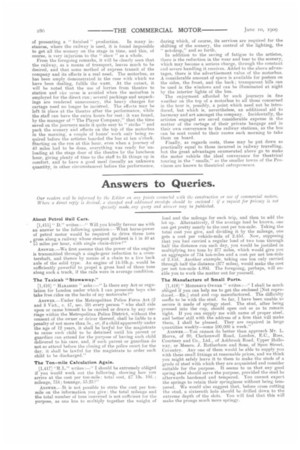Answers to Queries.
Page 20

If you've noticed an error in this article please click here to report it so we can fix it.
Our readers will be informed by the Editor on day points conneced with Me construction or use of commercial motors. Where a direct reply is desired, a stamped and addressed envelope should be enclosed : if a request for Privacy is not specially made, any query and answer may be published.
About Petrol Rail Cars.
[1,415] " D." writes :—" Will you kindly favour me with an answer to the followiug question :—What horse-power of petrol motor would be required to drive three tons • gross along a railway whose steepest gradient is 1 in 40 at _ 10 miles per hour, with single chain-drive F" ANswea.—We first assume that the power of the engine is transmitted through a single-gear reduction to a countershaft, and thence by means of a chain to a live back axle of the solid type. Au engine of 14-161t.p. would be sufficiently powerful to propel a gross load of three tons along such a track, if the rails were in average condition. The Taxicab "Stowaway."
[1,416] " HARASSED " asks :—" Is there any Act or regulation for London under which I can prosecute boys who take free rides on the backs of my motorcabs ?"
Asuswea.—Under the Metropolitan Police Force Act (2 and 3 Viet., c. 47, sec. 59) every person " who shall ride upon or cause himself to be carried or drawn by any carriage within the Metropolitan Police District, without the consent of the owner or driver thereof, shall be liable to a penalty of not more than 5s., or, if a child apparently under the age of 12 years, it shall be lawful for the magistrate to cause such child to be detained until his parent or guardian can attend for the purpose of having such child delivered to his care, and, if such parent or guardian do not so attend before the closing of the police court for the day, it shall be lawful for the magistrate to order such child to be discharged."
The Ton-mile Calculation Again.
[1,417] "ICI," writes :—" I should be extremely obliged if you would work out the following, showing how you arrive at the cost per ton-mile : total cost, £7 13s. 10d. ; mileage, 754; tonnage, 53.25 ?"
ANSWER.—It is not possible to state the cost per tonmile on the information you give : the total mileage and the total number of tons conveyed is not sufficient for the purpose, as one has to multiply together the weight of
load and the mileage for each trip, and then to add the lot up. Alternatively, if the average load be known, one can get pretty nearly to the cost per ton-mile. Taking the total cost you give, and dividing it by the mileage, one gets a cost per vehicle-mile of 2.45d. Now, supposing that you had carried a regular load of two tons through half the distance run each day, you would be justified in multiplying two tons by 377 miles, which would give you an aggregate of 754 ton-miles and a cost per net ton-mile of 2.45d. Another example, taking one ton only carried through half the distance (377 miles), would make the cost per net ton-mile 4.90d. The foregoing, perhaps, will enable you to work the matter out for yourself.
The Manufacture of Small Parts.
[1,418] " Moroanus OWNER " writes :—" I shall be much obliged if you can help me to get the enclosed Not reproduced.—En.] stud and cup manufactured. The difficulty seeffis to be with the stud. So far, I have been unable to secure it made of springy steel. The stud, after being pressed into the cup, should open out so as to remain tight. If you can supply me with name of proper steel, and better still with the address of a firm that will make them. I shall be pleased. They are required in large quantities weekly—some 100,000 a week." ANSWER.—Yon cannot do better than approach Mr. L. Herve, of 90, Clerkenwall Road, London, E.G., Ross, Courtney and Co., Ltd., of Ashbrook Road, Upper Holloway, or Messrs. J. Rotherham and Sons, of Spon Street, Coventry. Any one of them would be able to supply you with these small fittings at reasonable prices, and we think you might safely leave it to them to make the studs of a grade of steel with which they are acquainted and consider suitable for the purpose. It seems to us that any good spring steel should serve the purpose, provided the stud be afterwards hardened and tempered. You cannot expect the springs to retain their springiness without being tempered. We would also suggest that, before cross cutting the stud, a sixteenth hole should be drilled down to the extreme depth of the slots. You will find that this will make the prongs much more springy.






















